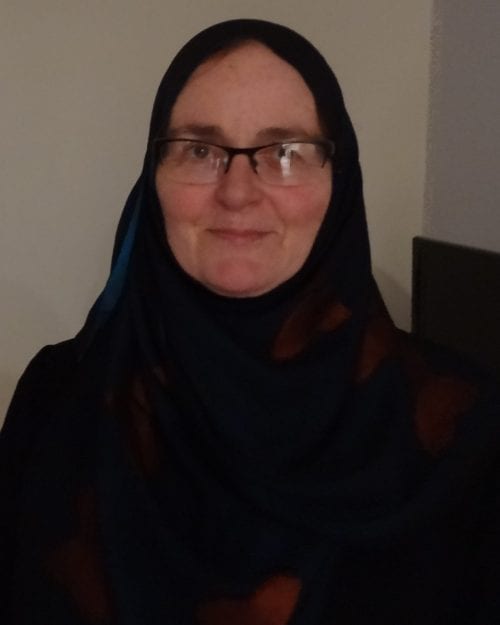Three years on since the Israeli bombardment of Gaza Julie Webb-Pullman recalls a makeshift morgue outside Al-Shifa Hospital, the lack of medical supplies to treat the wounded and the screams of children whose parents who have already been killed.
The scenes as I go to work each day are harrowing as I must walk past the morgue of Al-Shifa Hospital. For the first few days I didn’t even realise it was a morgue. There were a few cars parked outside, small groups of people clustered against the walls and family members grieving in the hospital grounds during a war. Not an uncommon sight.
Each day the numbers of cars and people grew and one morning the stark reality of what it was hit me. One day a car drove past me, stopped and a man approached it cradling a bright white, tightly swaddled body of a small child in his arms. Men ran out with a stretcher with a covered body on it – or so I thought.
As they ran past a bloodied limb fell onto the ground in front of me. It was not a body on the stretcher, but a collection of body parts, the horrific evidence of the type of weapons being used by Israel on Gaza’s civilians, some prohibited others so new they are still in the testing stages.
Read: 3 years on from Gaza war
![Gazan woman at the Shifa and Wafa Hospitals after bombs were shelled in 2014 [Julie Webb-Pullman/Middle East Monitor]](https://i0.wp.com/www.middleeastmonitor.com/wp-content/uploads/2017/07/2017_07_10-Gazan-chidren-at-the-Shifa-and-Wafa-Hospitals-after-bombs-were-shelled-in-2014DSC05902.jpg?resize=444%2C333&ssl=1)
Gazan woman at the Shifa and Wafa Hospitals after bombs were shelled in 2014 [Julie Webb-Pullman/Middle East Monitor]
The numbers outside the morgue swell and subside but the numbers inside only continue to grow. Some days I can’t even get through, other days ambulances or cars arrive and bodies are removed in front of my eyes, while relatives scream, faint, or numbly watch as yet another family member is taken from them.
The misery, the grief, the sheer human suffering is overwhelming. I walk on past and go upstairs to report on the dead and injured in facts and figures, my heart bursting, my soul shaken, and desperately trying to cling to that thing called humanity when there is so little evidence of it in what I have just seen.
Read: ‘Gaza is a ticking time bomb’
I go upstairs and see the exhausted doctors and surgeons, who two weeks ago were healthy, vibrant human beings now reduced to haggard, pale ghosts of themselves, struggling to keep going, to provide care and save lives when there is so little care to provide. There is no medicine, no supplies, no equipment, and lives that might be saved are lost to the sheer numbers demanding their attention.
Doctors must decide on the spot which patients live and which die, not because clinically they can’t all be saved, but because there are only resources enough to save one.
Doctors, nurses and hospital staff all now know that even in the hospitals they are not safe because Israel is deliberately attacking them. Three hospitals have been evacuated since Thursday; seven hospital staff have already been killed or injured.
Read: 10 Years of the Israeli siege on Gaza
Ambulance drivers and paramedics know that when they go to retrieve the injured that they may not return. Twelve ambulances have been destroyed, one driver killed and five paramedics injured. All in a day’s work. These people have not been paid for months; they are doing this out of their own sense of compassion and duty.
![Destroyed and damaged buildings in Gaza during Israel’s war on Gaza [War in Gaza 096/Wikipedia]](https://i0.wp.com/www.middleeastmonitor.com/wp-content/uploads/2017/07/2009_1_24-Destoyed-and-damaged-buildings-in-Gaza-City1024px-War_in_Gaza_096_-_Flickr_-_Al_Jazeera_English.jpg?resize=500%2C333&ssl=1)
Image of destroyed and damaged buildings in Gaza City left behind by the war [War in Gaza 096/Wikipedia]
#GazaWar
No one knows if or which of them will get out of there, and if and when they do, will they be able to walk, talk, feed themselves, study, work or have any semblance of the normal future their mothers hoped for them. Fathers who have collapsed are wracked with guilt that they did not, could not, protect their family.
I walk outside and the sky is blue, the sun is shining. Birds are even singing. I want to scream at them, “don’t you know what is happening?” I walk home beneath the ever-present drones, the sound of explosions almost keeping pace with my footsteps. I go back past the morgue, now shut up, and deserted – on the outside at least.
A group of children run past carrying bottles of water, giggling and falling over, helping each other up. I pass the maternity ward, see a man in the street calling to his wife who appears in a window and holds up their newborn baby for him to see.
I wonder, was this deliberate, putting a maternity unit next to the morgue so that as one leaves the affirmation of life is what remains?
After all, this is Gaza, where mere existence is resistance.
The views expressed in this article belong to the author and do not necessarily reflect the editorial policy of Middle East Monitor.

![A damaged ambulance which was bombed during Israel's war on Gaza in 2014 [Boris Niehaus/Wikipedia]](https://i0.wp.com/www.middleeastmonitor.com/wp-content/uploads/2017/07/2014_8_6-gaza-warDestroyed_ambulance_in_the_CIty_of_Shijaiyah_in_the_Gaza_Strip-1.jpg?fit=920%2C613&ssl=1)

![2017_07_10 - Gazan chidren at the Shifa and Wafa Hospitals after bombs were shelled in 2014Itaf Kali Gazan woman at the Shifa and Wafa Hospitals after bombs were shelled in 2014 [Julie Webb-Pullman/Middle East Monitor]](https://i0.wp.com/www.middleeastmonitor.com/wp-content/uploads/2017/07/2017_07_10-Gazan-chidren-at-the-Shifa-and-Wafa-Hospitals-after-bombs-were-shelled-in-2014Itaf-Kali.jpg?w=584&h=438&ssl=1)
![2017_07_10 - Gazan chidren at the Shifa and Wafa Hospitals after bombs were shelled in 2014DSC05809 Gazan chidren at the Shifa and Wafa Hospitals after bombs were shelled in 2014 [Julie Webb-Pullman/Middle East Monitor]](https://i0.wp.com/www.middleeastmonitor.com/wp-content/uploads/2017/07/2017_07_10-Gazan-chidren-at-the-Shifa-and-Wafa-Hospitals-after-bombs-were-shelled-in-2014DSC05809.jpg?w=328&h=438&ssl=1)
![2017_07_10 - Gazan chidren at the Shifa and Wafa Hospitals after bombs were shelled in 2014DSC05799 Gazan chidren at the Shifa and Wafa Hospitals after bombs were shelled in 2014 [Julie Webb-Pullman/Middle East Monitor]](https://i0.wp.com/www.middleeastmonitor.com/wp-content/uploads/2017/07/2017_07_10-Gazan-chidren-at-the-Shifa-and-Wafa-Hospitals-after-bombs-were-shelled-in-2014DSC05799.jpg?w=916&h=733&ssl=1)






